But just 31% want to phase out use of fossil fuels completely
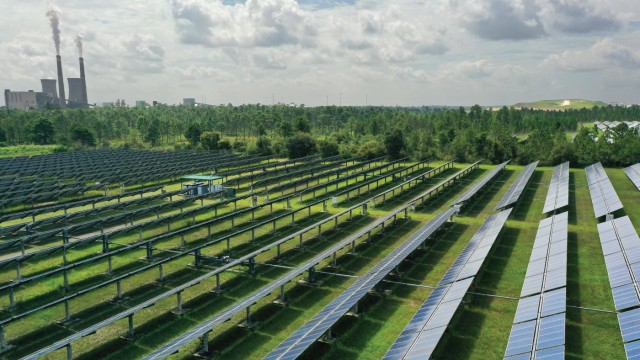
Pew Research Center conducted this study to understand how Americans view climate and energy issues. For this analysis, we surveyed 10,237 U.S. adults from Jan. 24 to 30, 2022.
Everyone who took part in the survey is a member of the Center’s American Trends Panel (ATP), an online survey panel that is recruited through national, random sampling of residential addresses. This way, nearly all U.S. adults have a chance of selection. The survey is weighted to be representative of the U.S. adult population by gender, race, ethnicity, partisan affiliation, education and other categories. Read more about the ATP’s methodology.
Here are the questions used for this report, along with responses, and its methodology.
Amid growing global energy demand and rising carbon dioxide emissions, majorities of Americans say the United States should prioritize the development of renewable energy sources, such as wind and solar, and take steps toward the country becoming carbon neutral by the year 2050.
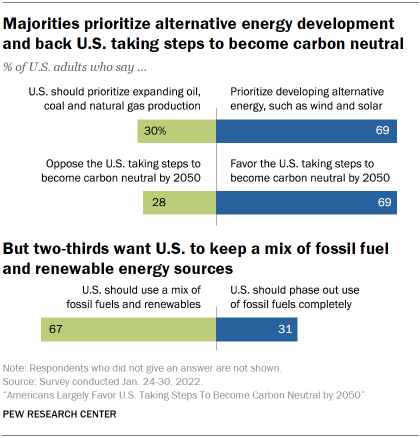
Still, Americans stop short of backing a complete break with fossil fuels and many foresee unexpected problems in a major transition to renewable energy. Economic concerns are also front of mind for many when asked to think about what a transition away from fossil fuels could mean for their own lives.
The new Pew Research Center survey of 10,237 U.S. adults conducted from Jan. 24 to 30, 2022, finds that 69% of U.S. adults prioritize developing alternative energy sources, such as wind and solar, over expanding the production of oil, coal and natural gas. The same share (69%) favors the U.S. taking steps to become carbon neutral by 2050, a key component of President Joe Biden’s climate and energy policy agenda.
A relatively small share of Americans (31%) believe the U.S. should phase out the use of oil, coal and natural gas completely; far more (67%) say the country should use a mix of fossil fuel and renewable energy sources. Officials are considering ways to remove carbon emissions from the atmosphere through tree plantings as well as carbon capture and storage techniques.
The survey was conducted prior to escalating tensions and Russia’s invasion of Ukraine that have driven increased uncertainty in global energy markets.
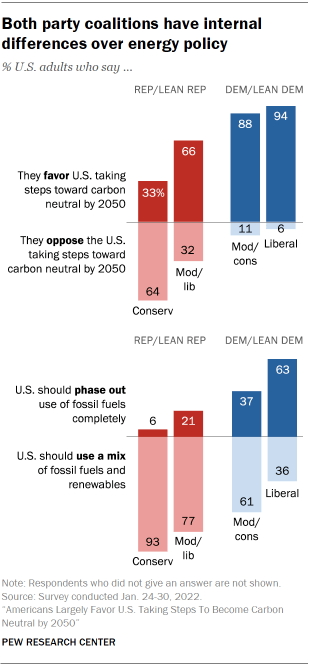
Partisan affiliation remains the dominant divide in views of climate and energy issues, with Republicans and Democrats staking out competing visions for the country’s energy future.
On balance, Republicans and Republican-leaning independents give greater priority to expanding the production of oil, coal and natural gas than to developing alternative energy sources, and they overwhelmingly believe that fossil fuels should remain a part of the energy picture in the U.S.
Among Democrats and Democratic leaners, very large majorities support prioritizing the development of alternative energy sources and favor the U.S. taking steps to become carbon neutral by 2050.
Still, energy issues surface fault lines within both partisan coalitions.
Within the GOP:
- There is internal disagreement around the goal of the U.S. becoming carbon neutral: 66% of self-described moderate and liberal Republicans favor taking steps toward this, while 64% of conservative Republicans oppose this.
- There is a similar divide by political ideology over the country’s more important energy priority: 64% of moderate and liberal Republicans say it should be developing alternative sources such as wind and solar, whereas 67% of conservative Republicans say it should be expanding production of oil, coal and natural gas.
Among Democrats and independents who lean toward the Democratic Party:
- There is a split over whether the U.S. should phase out the use of oil, coal and natural gas completely (49% of Democrats say this) or use a mix of energy sources, including fossil fuels along with renewable sources (50%).
- This overall divide reflects competing views within the Democratic Party: 63% of liberal Democrats say the U.S. should phase out the use of fossil fuels completely, while a majority of moderate and conservative Democrats (61%) say it should use a mix of energy sources.
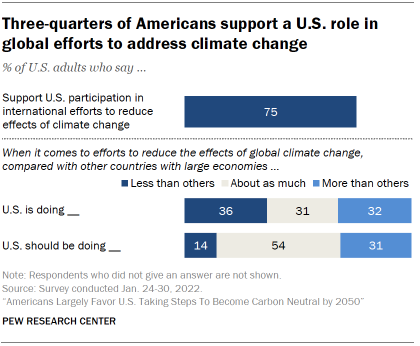
The new Center survey comes on the heels of U.S. participation in the United Nations Climate Change Conference (COP26) held in Glasgow last November. The survey finds broad support for the U.S. participating in international efforts to help reduce the effects of climate change; 75% favor and only 24% oppose this.
In thinking about the U.S. role in addressing global climate change, 54% of Americans say the U.S. should do about as much as other countries with large economies. About three-in-ten (31%) say it should be doing more than other large economies to help reduce climate change impacts, and 14% think the U.S. should do less than other countries with large economies.
There is little consensus over how much the U.S. is currently doing to address climate change: 36% say the U.S. is doing less than other countries with large economies to reduce the effects of climate change, while 32% say it is doing more and 31% say it is doing as much as others with large economies.
Partisans generally agree that the U.S. should do at least as much as other countries with large economies in this area. But about half of Republicans (51%) think the U.S. is currently doing more than others, while about half of Democrats (49%) think the U.S. is currently doing less than other countries.
The nationally representative survey of 10,237 U.S. adults conducted from Jan. 24 to 30, 2022, explores Americans’ views on the interrelated issues of energy and climate policy. Other key findings include:
A 72% majority says the federal government should encourage the production of wind and solar power. About half (51%) say it should encourage the use of electric vehicles, while about a third say it should encourage the production of nuclear power (35%) and oil and gas drilling (33%). Fewer (20%) say the federal government should encourage coal mining, with the remainder saying that the government should either discourage coal mining or do neither of these.
Many Americans anticipate new problems for the country if it were to greatly reduce fossil fuel energy production while increasing renewable energy production. Seven-in-ten say it’s very or somewhat likely a major shift to renewable sources would lead to unexpected problems for the country. Americans are divided over whether a major shift from fossil fuel to renewable energy sources over the next 30 years would make the prices they pay to heat and cool their homes better (39%) or worse (39%). Another 20% say this would have no effect on these prices. Still, there’s optimism over how a possible energy transition would impact other aspects of life: 63% think it would make their local air and water quality better and 56% think it would have a positive impact on local job opportunities in the energy sector.
Even as Americans express concerns about a major shift away from fossil fuels, 72% say it’s likely a transition would not happen fast enough to prevent severe problems from climate change. Overall, 85% of Democrats and Democratic leaners as well as 58% of Republicans and Republican leaners say it is at least somewhat likely that a major energy transition would not happen fast enough to prevent severe problems from climate change.
Partisan gaps widen over the environmental and economic effects of policies aimed at reducing the effects of climate change. Democrats have become increasingly convinced that climate policies do more good than harm for the environment and help the U.S. economy. By contrast, Republicans take a mixed view of the environmental impact of policies aimed at reducing the effects of global climate change, and 62% now say they generally hurt the U.S. economy – up from 52% who said this in 2019.
72% of Americans believe the federal government should encourage wind and solar power production
Americans’ views on the federal government’s role in energy activities reflect the greater priority they give to developing renewable over fossil fuel energy sources.
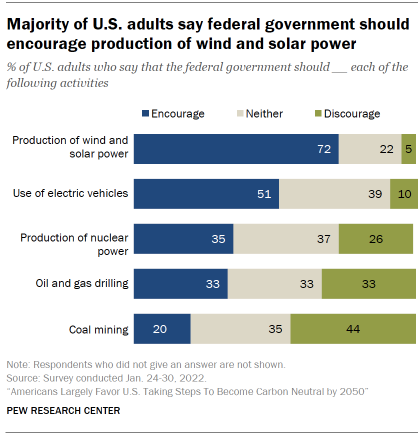
A majority of Americans (72%) think the federal government should encourage the production of wind and solar power; just 5% say the federal government should discourage this and 22% say the government should neither encourage nor discourage production of wind and solar power.
On balance, more say the federal government should encourage than discourage the use of electric vehicles (51% vs. 10%); 39% say the federal government should neither encourage nor discourage this.
Americans express more mixed views on how the federal government should engage with nuclear power production and oil and gas drilling. More say the federal government should encourage (35%) than discourage (26%) the production of nuclear power, while 37% say the government should do neither. Views about oil and gas drilling are evenly divided: Equal shares say the federal government should encourage, discourage and neither encourage nor discourage this (33% each).
Opinion is more negative toward a government role in coal mining. More say the federal government should discourage than encourage this activity (44% vs. 20%); 35% say it should do neither.
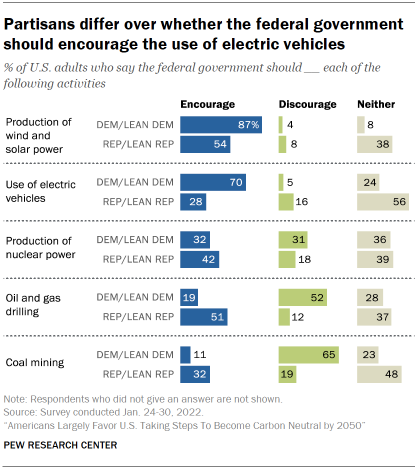
Republicans and Democrats differ over the types of energy-related activities they think the federal government should encourage or discourage.
An overwhelming majority of Democrats and Democratic-leaning independents say the federal government should encourage the production of wind and solar power (87%). Seven-in-ten Democrats also say this about the use of electric vehicles. Democrats are about evenly divided over the role they think the federal government should play regarding nuclear power. Their views tilt negative when it comes to fossil fuels: 52% of Democrats say the federal government should discourage oil and gas drilling and 65% say it should discourage coal mining.
Among Republicans and Republican leaners, views toward fossil fuel energy production are much less negative. Overall, 51% of Republicans say the federal government should encourage oil and gas drilling, while just 12% say they should discourage it (37% say it should do neither). And more Republicans say the federal government should encourage than discourage coal mining, albeit by a narrower margin (32% to 19%). At the same time, 54% of Republicans say the federal government should encourage wind and solar power. On the use of electric vehicles, 56% say the federal government should neither encourage nor discourage this.
Wide divides between Democrats and Republicans over U.S. taking steps to become carbon neutral; some differences within partisan coalitions
The Biden administration has announced policies aimed at dramatically reducing carbon dioxide emissions in the U.S. as part of a goal to be carbon neutral by 2050. Meeting this goal would require major changes to the U.S. energy sector, according to experts.
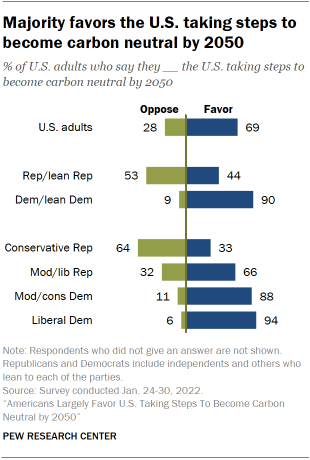
The new survey finds 69% of Americans say the more important energy priority for the country should be developing renewable energy sources, such as wind and solar; fewer (30%) prioritize expanding the production of fossil fuels, such as oil, coal and natural gas. These figures are roughly the same as when last asked in April 2021. See the Appendix for more details.
Consistent with this view, 69% of Americans say they favor the U.S. taking steps to become carbon neutral by 2050 – that is, releasing no more carbon dioxide into the atmosphere than it removes; 28% of Americans say they oppose this.
Still, at present, the public generally opposes breaking with fossil fuels entirely. Two-thirds (67%) say the U.S. should use a mix of energy sources including oil, coal and natural gas along with renewable energy sources. A smaller share (31%) says the U.S. should phase out fossil fuels completely and only rely on renewable sources such as wind and solar power.
Nearly all Democrats and independents who lean to the Democratic Party (90%) favor the U.S. taking steps to become carbon neutral by 2050, a key component of Biden’s environmental policy goals.
In contrast, slightly more than half (53%) of Republicans and GOP leaners oppose this goal, while 44% favor it.
There are notable differences of opinion among Republicans by political ideology as well as age.
Conservative Republicans oppose the U.S. taking steps to become carbon neutral by about a two-to-one margin (64% to 33%). By contrast, 66% of moderate and liberal Republicans favor this goal.
The youngest Republicans, ages 18 to 29, largely support the U.S. taking steps to become carbon neutral by 2050 (67% favor). Support is lower among older Republicans, with majorities of those 50 and older opposing this goal. See Appendix for more details.
Among Democrats, large majorities across age and political ideology say they favor the U.S. taking steps to become carbon neutral by 2050.
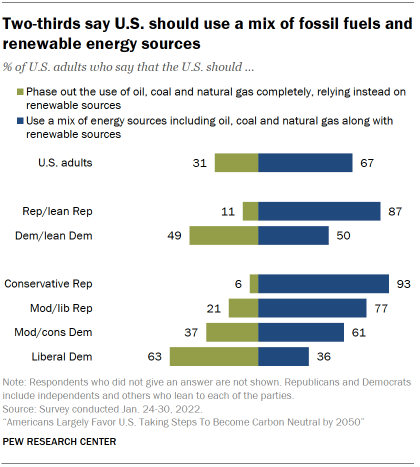
Differences between Republicans and Democrats are similarly large when it comes to the question of whether the U.S. should use a mix of renewable and fossil fuel energy sources or should phase out the use of oil, coal and natural gas completely.
An overwhelming majority of Republicans (87%) think the U.S. should use a mix of energy sources including oil, coal and natural gas along with renewable sources.
By contrast, Democrats are roughly divided in their views: Half say the U.S. should use a mix of energy sources, while about the same share (49%) thinks the U.S. should phase out the use of fossil fuels completely and rely instead on sources such as wind and solar.
There are wide differences of opinion on this question among Democrats by ideology. A majority of moderate and conservative Democrats (61%) think the U.S. should use a mix of both fossil fuel and renewable energy sources going forward. A majority of liberal Democrats (63%) take the opposite view and say the U.S. should phase out the use of oil, coal and natural gas completely and rely instead on renewable sources.
Younger adults, ages 18 to 29, are about as likely to say the U.S. should phase out fossil fuels completely (48%) as to say it should use a mix of energy sources (50%). In contrast, roughly two-thirds or more of older adults in every other age group say the U.S. should use a mix of fossil fuels and renewable energy sources rather than phase out fossil fuels completely. Age differences in views are seen within both the Republican and Democratic parties. See Appendix for more details.
What would a transition to renewable energy mean for Americans?
When asked to think about how a possible shift from fossil fuels to renewable energy sources would impact their own local area, a majority of the public anticipates benefits for air and water quality as well as energy sector jobs in their local area. Yet sizable shares also anticipate higher costs for consumer goods and heating and cooling their homes.
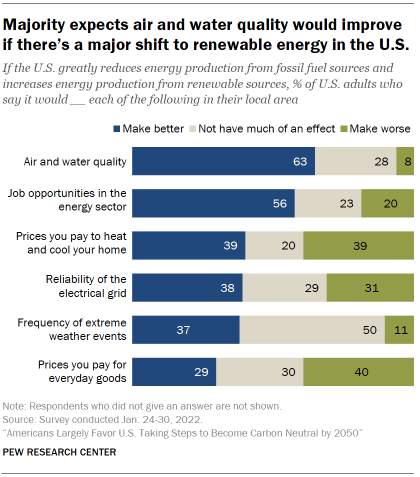
Asked to think about the next 30 years, 63% of U.S. adults think air and water quality in their local area would get better if the U.S. greatly reduced energy production from fossil fuel sources such as oil, coal and natural gas while greatly increasing production from renewable sources such as wind and solar. About three-in-ten (28%) say such a transition would not have much of an effect on local air and water quality, while just 8% say it would make it worse.
On balance, more Americans think a possible transition to renewable energy production would make energy job opportunities in their local area better than worse (56% vs. 20%); 23% do not think it would have much of an effect.
Public expectations are less positive when it comes to prices. As many expect that a major shift from fossil fuel to renewable energy sources over the next 30 years would make the prices they pay to heat and cool their home better (39%) as worse (39%). And expectations tilt negative when it comes to prices for consumer goods: 40% think a major shift to renewable energy production would make these prices worse, while 29% think it would make them better.
A slightly larger share of U.S. adults say transitioning from fossil fuel to renewable sources would have a positive rather than negative effect on the reliability of the electrical grid (38% vs. 31%). About three-in-ten think an energy transition would not have much of an effect on the reliability of the electrical grid.
More say a renewable energy transition would make the frequency of extreme weather events better than w0rse in the U.S. (37% vs. 11%), though 50% say they don’t think it would have much of an effect.
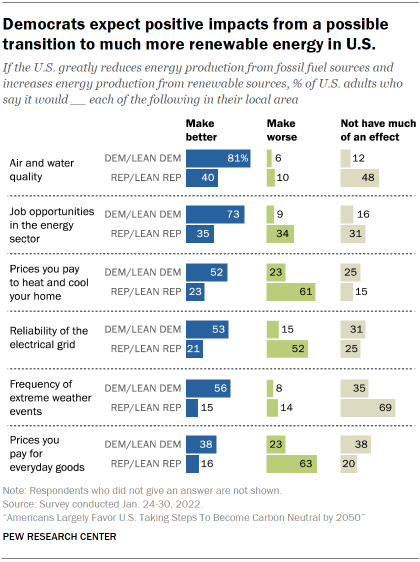
Democrats and Democratic leaners are much more optimistic than Republicans and Republican leaners about the possible impacts of a major transition from fossil fuel to renewable sources for energy production.
Much larger shares of Democrats than Republicans say reducing energy production from fossil fuels and increasing from renewable sources would make air and water quality (81% vs. 40%) and job opportunities in the energy sector (73% vs. 35%) better. Democrats are also far more likely than Republicans to say an energy transition would have a positive effect on the frequency of extreme weather (56% vs. 15%).
Conversely, Republicans are far more likely than Democrats to foresee greater pressure on prices if the country greatly shifts toward renewable energy sources over the next 30 years. A majority of Republicans (61%) say this potential energy transition would make home energy prices worse, compared with just 23% of Democrats. There’s a similar gap in the shares of Republicans and Democrats who say a transition from fossil fuel to renewable energy sources would make the prices paid for everyday goods worse (63% vs. 23%).
When it comes to the reliability of the electrical grid, about half of Republicans (52%) think a transition from fossil fuels to renewables would make it worse; a similar share of Democrats (53%) think it would make it better.
Americans see unexpected problems – as well as climate risks from not moving fast enough – in a possible transition to increased production of renewable energy
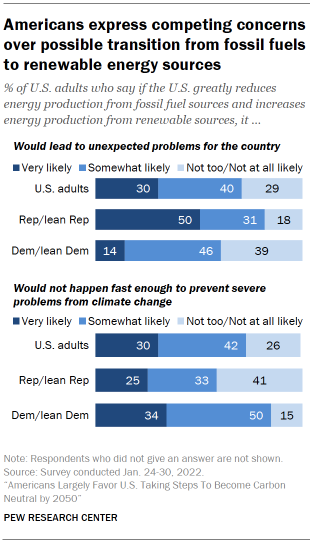
Asked about the implications of a transition from fossil fuel to renewable sources in a more general way, 72% of Americans think it’s very or somewhat likely that this shift would not occur fast enough to prevent severe problems from climate change. A similar share (70%) thinks such a transition would be at least somewhat likely to cause unexpected problems for the country.
A large share of Republicans see a potential shift in energy sources as very (50%) or somewhat (31%) likely to be accompanied by unexpected problems. Six-in-ten Democrats also think unexpected problems are likely (though just 14% view this as very likely).
Majorities of both parties say it’s very or somewhat likely that a major energy transition would not happen fast enough to prevent severe problems from climate change (85% of Democrats and 58% of Republicans say this would be at least somewhat likely).
Main benefits – and downsides – that Americans foresee if U.S. phases out fossil fuels

Environmental and climate benefits are top of mind for many Americans when asked to explain, in an open-ended question, what they think the main benefit would be from phasing out the use of oil, coal and natural gas completely.
About four-in-ten U.S. adults (43%) cite environmental and climate factors as benefits to phasing out fossil fuels, including roughly two-in-ten who mention a reduction in carbon emissions or that this shift would save the planet for future generations.
Far fewer mention other potential benefits: 8% say reducing dependence on foreign energy sources would be the main benefit to phasing out fossil fuels, while 8% also cite economic benefits such as lower energy costs or new jobs.
Overall, 13% of Americans say there would be no benefit from such a shift and 25% did not give an answer.
Among the roughly third of Americans who support the U.S. phasing out fossil fuels completely, a majority (61%) raise environmental and climate factors as the main benefit to doing so. Far fewer of those who support the U.S. continuing to use a mix of fossil fuel and renewable energy sources (34%) mention upsides for the environment and climate from this possibility. And about two-in-ten (19%) of this group say there would be no benefit to phasing out oil, coal and natural gas completely.
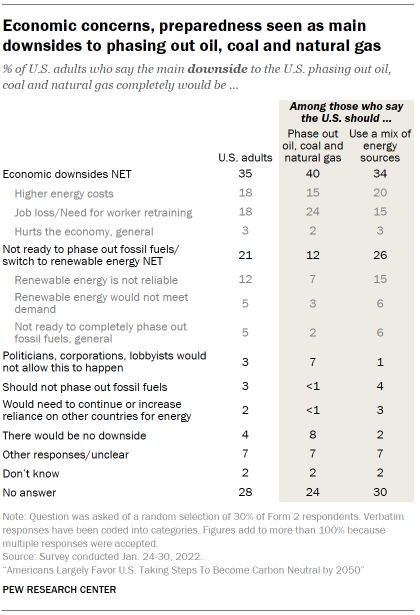
Economic factors loom large in anticipated downsides from the possibility of phasing out fossil fuels completely.
About a third (35%) of U.S. adults raise economic factors as the main downside to such an energy transition, including 18% who mention job losses and 18% who point to higher energy costs.
About one-in-five (21%) raise concerns about the reliability of renewable energy sources or say that the country is not ready to phase out fossil fuels entirely.
The majority of Americans who say the U.S. should continue to use a mix of fossil fuel and renewable energy sources are more likely to raise concerns about the reliability of an energy system based solely on renewable energy sources.
About four-in-ten homeowners say they’ve seriously considered installing solar panels
Among U.S. homeowners, 39% say they have given serious thought to installing solar panels for their home within the past 12 months; 8% say they already have installed solar panels. The share of homeowners who say they have installed solar panels is up from 6% in 2019, though the share who say they have given installation serious consideration is down 7 percentage points.
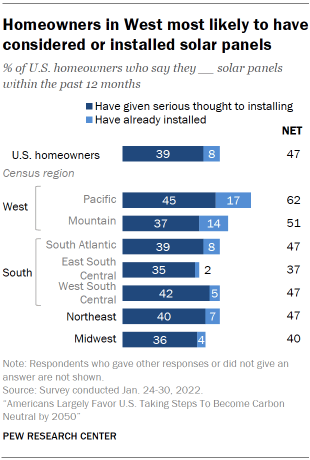
Western homeowners are especially likely to have considered, or installed, solar panels in their homes, consistent with past Center surveys and with data from the U.S. Energy Information Administration (EIA) on small-scale solar capacity.
Among homeowners in the Pacific region, 45% say they’ve given serious thought to installing solar panels to generate electricity for their home and 17% say they have already done this. The region includes California, where solar panels are now mandated for new home construction and multi-family dwellings under three stories.
Partisanship is also linked to consideration and installation of home solar panels. Democrats and those who lean to the Democratic Party are more likely (57%) than Republicans and those who lean to the Republican Party (36%) to say they have installed or given serious thought to installing solar panels in their homes. In the Pacific region, 73% of Democrats have either installed (22%) or say they have seriously considered adding solar panels to their home; this compares with 46% of Republicans in the region who have installed solar panels (13%) or given serious thought to doing so.
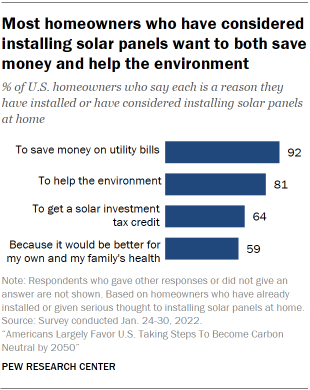
Most homeowners who have installed or are seriously considering solar panels at home (92%) say that saving money on utilities is a motivation for adding solar panels.
A large majority (81%) of this group also says helping the environment is a reason they have considered or installed solar panels at home.
Smaller majorities say their reasons include a solar investment tax credit (64%) and because it would be better for the health of their family (59%).
Nearly all Democratic (91%) and Republican (92%) homeowners in this group say that saving on utilities is a reason they have thought about or installed solar panels. Democratic homeowners are more likely than Republican homeowners to say that helping the environment (95% vs. 59%) or health benefits for their own or their family’s health (71% vs. 39%) is a reason they have considered or installed solar panels at home.
Partisan disagreement over human role in climate change, policy impacts
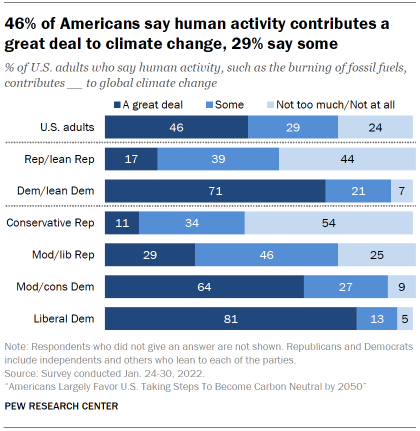
A majority of Americans continue to see a connection between human activity, such as the burning of fossil fuels, and global climate change. However, there is no public consensus on the strength of the connection. Partisans continue to express starkly different views on climate-related questions.
In all, 46% of U.S. adults say human activity contributes a great deal to climate change, while 29% say it contributes some. About a quarter of Americans (24%) say human activities, including the burning of fossil fuels, contributes not too much or not at all to climate change. Views on this question have held mostly steady in recent years.
Democrats and Republicans continue to have very different views on the role of human activity in climate change. A large majority of Democrats say humans contribute a great deal (71%). By contrast, just 17% of Republicans say this; 39% of Republicans say human activity contributes some to climate change and 44% think it contributes not too much or not at all.
There are sizable differences by ideology within both partisan groups on this issue. A larger majority of liberal than conservative and moderate Democrats and Democratic leaners say human activity contributes a great deal to climate change (81% vs. 64%). Among Republicans and Republican leaners, moderates are more likely than conservatives to say humans contribute a great deal to climate change (29% vs. 11%). Slightly more than half of conservative Republicans (54%) say human activity contributes not too much or not at all to global climate change.
Among Democrats, education is related to the shares who say human activity contributes a great deal to climate change. Overall, Democrats with a postgraduate degree are 26 percentage points more likely than those with a high school degree or less to say human activity contributes a great deal to climate change (84% vs. 58%). Among Republicans, there are no differences by education in the shares who take this view. This pattern is consistent with past Center surveys.
Growing shares of Republicans now say climate policies hurt the economy; Democrats increasingly see environmental benefits
Americans hold mixed views about how policies aimed at reducing the effects of global climate change affect the economy. On balance, views of how these policies impact the environment are more positive than negative.
About as many Americans say policies aimed at reducing the effects of global climate change generally help as hurt the U.S. economy (37% to 35%); 27% say they think these policies make no difference for the economy.
The share of Americans saying climate policies help the U.S. economy is up 7 points over the last four years, driven by more positive assessments of Democrats. A majority of Democrats and Democratic leaners (55%) now say climate policies generally help the economy, up 10 points from 2018. By contrast, Republicans have becoming increasingly likely to say these policies hurt the U.S. economy: 62% of Republicans and Republican leaners think policies aimed at reducing the effects of global climate change generally hurt the economy, while 57% said this in 2018.
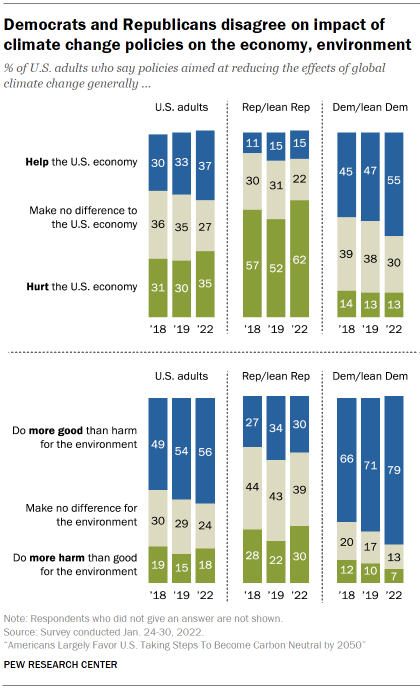
When it comes to the environment, 56% of Americans think policies aimed at addressing climate change generally do more good than harm for the environment; just 18% say they generally do more harm, while 24% say these policies don’t make a difference for the environment.
Democrats have become increasingly convinced of the environmental benefits of climate policies: 79% say they generally do more good than harm for the environment, up from 66% who said this in 2018.
Republicans are divided in their views. As many say these climate policies do more good for the environment as say they do more harm (30% each); 39% say these policies don’t make a difference for the environment.
Majority backs U.S. participation in international climate change efforts
Americans are broadly supportive of the U.S. playing a role in international efforts to reduce global climate change: Three-quarters say they strongly or somewhat support the U.S. participating in international climate efforts, and 24% say they oppose this.
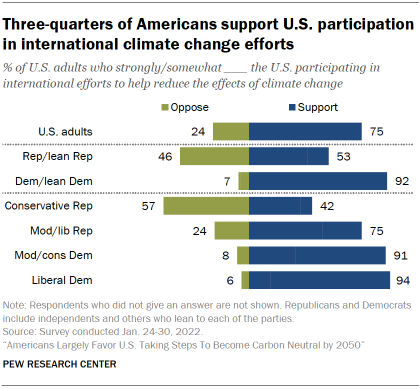
An overwhelming majority of Democrats and Democratic leaners (92%) support the U.S. participating in international efforts to help address global climate change. Opinion is more divided among Republicans and Republican leaners: 53% support U.S. participation in these efforts, while 46% oppose it.
A majority of moderate Republicans (75%) support the U.S. being part of international efforts to reduce climate impacts. By contrast, conservative Republicans are more likely to say they oppose (57%) than support (42%) U.S. participation.
Asked to consider what role the U.S. should play relative to other countries who also have a large economy, 54% of Americans say the U.S. should do about as much as other countries to help reduce the effects of global climate change. About a third (31%) say it should do more than other countries with large economies, while 14% say it should do less.
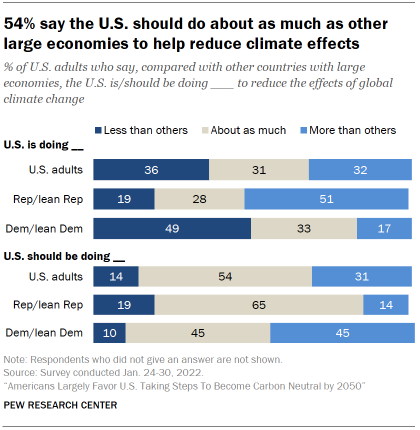
Americans express mixed views on how much the U.S. is currently doing in this arena. Overall, 36% say the U.S. is doing less than other countries with large economies, while nearly as many (32%) say it is doing more; 31% say it is doing about as much as others.
Partisan groups view U.S. participation in international climate efforts quite differently.
About two-thirds of Republicans (65%) say the U.S. should do about as much as other countries with large economies in international climate change efforts. Roughly half of Republicans (51%) say the country is currently doing more than others; relatively few think it is doing less (19%).
On balance, Democrats think the country is currently doing less than other countries rather than more (49% to 17%); 33% say the U.S. is currently doing about as much as other countries with large economies. Democrats generally support the U.S. doing as much (45%) or more than other countries with large economies (45%) to help reduce the effects of global climate change; just one-in-ten say it should do less than others.
53% of Americans express doubt that global efforts by the U.S. and others will be enough to avoid the worst impacts of climate change
Americans are largely pessimistic that the U.S. and countries around the world will do enough to head off the worst climate change impacts.
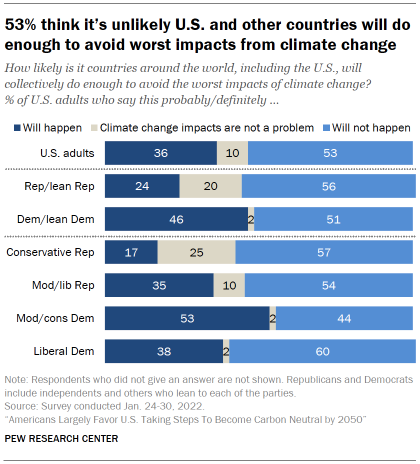
Overall, 53% of Americans think countries around the world, including the U.S., will probably or definitely not do enough to avoid the worst impacts from climate change. A smaller share (36%) thinks collective action globally will likely be enough to avoid the worst impacts from climate change; 10% say they don’t view climate change impacts as a problem.
Among Democrats and Democratic leaners, 51% do not expect countries around the world will do enough t0 avoid the worst from climate change; slightly fewer (46%) think countries will collectively do enough. Moderate and conservative Democrats are more optimistic that global efforts will avert the worst impacts from climate change, compared with liberal Democrats.
The balance of opinion among Republicans and independents who lean to the GOP is more pessimistic than among Democrats: 56% of Republicans expect that global efforts will not be enough to avoid the worst impacts of climate change, while 24% think such efforts will likely be enough to avoid them and one-in-five say that climate change impacts are not a problem.
A majority of Americans reject idea that U.S. has a responsibility to help developing countries build more renewable energy sources as part of international climate efforts
One of the major topics discussed at the November 2021 United Nations conference on climate change (known as COP26) was financial assistance for developing countries to help increase their renewable energy sources.
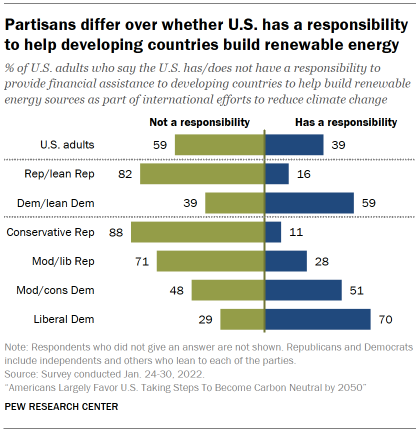
About four-in-ten Americans (39%) say the U.S. has a responsibility to provide international aid for this purpose as part of international efforts to reduce the effects of climate change, while a majority of 59% says it does not.
Most Republicans (82%) say that the U.S. does not have this responsibility, including 88% of conservative Republicans and 71% of moderate and liberal Republicans.
Among Democrats, 59% say that the U.S. has a responsibility to provide financial assistance to developing countries to help build renewable energy sources and move away from fossil fuels. Liberal Democrats are especially likely to take this view (70%). By contrast, moderate and conservative Democrats are roughly split over whether this is a U.S. responsibility or not.




